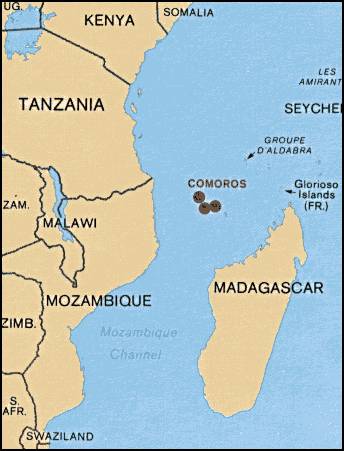Once an important stop in the trade route, the
Comoros Islands lie just north of the island of Madagascar, off the
southeastern coast of Africa in the Mozambique Channel (closest to the mainland
country of Mozambique). Consisting of three main islands now – Grand Comore (or
Ngazidja), Mohéli (or Mwali), and Anjouan (or Nzwani) – the country used to be
four islands. When they were deliberating on declaring their independence from
France, only the island of Mayotte abstained, which is why it’s still a
dependent of France. Although I think Comoros still claims them.
The word Comoros is based on the Arabic word qamar, which means moon. The native
peoples, probably from a larger extension of the Bantu expansion mixed with
migrants from other Asian and Middle Eastern regions, highly valued the nature
all around them. According to Comorian myth, a spirit dropped a jewel into the
ocean, which created the Karthala volcano and subsequently the islands of Comoros.
(Mt. Karthala was last active back in 2006.) Omani sailors once referred to
this area as the Perfume Islands, which is one of the reasons why it was such
an important stop in the trade route. Comoros is the leading producer of
ylang-ylang, a flower whose essential oil goes into many perfumes to give it a
flowery smell, like in Chanel No. 5. It’s also used as a remedy for high blood
pressure, certain skin problems, and as part of aromatherapy, and as an
aphrodisiac. (And as a popular ice cream flavor in nearby Madagascar. Would
that make it a health food? I think it would in my book.) Besides ylang-ylang,
Comoros is also known for its production of coconuts, vanilla (the second
largest exporter in the world, behind Madagascar), coffee, and the cocoa bean.
– All of my favorites. See, I knew I would like this country.
The capital city of Moroni lies on the largest
island of Grande Comore. With a population of about 60,000, it’s one of the
major ports in Comoros. It was founded by Arab settlers as a sister port for
commercial trade with Zanzibar (Tanzania). A little known fact – how I could
have forgotten this is beyond comprehension – is that Moroni is mentioned in
the game Where in the World is Carmen Sandiego? That was my favorite game when I was in middle school.
Because of its proximity and influences from the
Middle East, Comoros is a primarily Muslim nation, with the exception of
Mayotte, which still has a large Roman Catholic following. While the entire
country has less than a million people (about the population of my city,
Indianapolis, IN), it is one of the most densely populated. Most Comorians
speak Comorian (sometimes called Shikomor), which is a language that is based
on Swahili that is heavily influenced by Arabic. The two languages share many
common words anyway, so this would be similar to a sort of hybrid, I suppose.
(My son’s name is Swahili: Jabari; and his middle name is Arabic: Malik.) The
interesting thing about the Comorian language is that there isn’t any
established written script. Comorian words are either written in Latin or
Arabic script. French and Arabic are also official languages of Comoros because
of its history: French being the primary language of educational instruction
and Arabic being the primary language of religious instruction.
Since its independence from France in 1975, there
have been roughly 20 coups. The government situation at any given time is
relatively unstable. This is more or less one of the causes that most of its
people live on less than $1.25 a day. Another reason is that the land isn’t
very good at producing a variety of vegetables and other food products, so
besides what can be grown and caught in the ocean locally, many products have
to be imported in which directly impacts their economy. But despite their political and economic
situation, Comorians have found through their food and music and arts – as
diverse and regionally influenced as it is – that these are the things to help
you move forward in life. And I completely agree. It all sounds amazing to me
so far.
Up next: holidays and celebrations




No comments:
Post a Comment